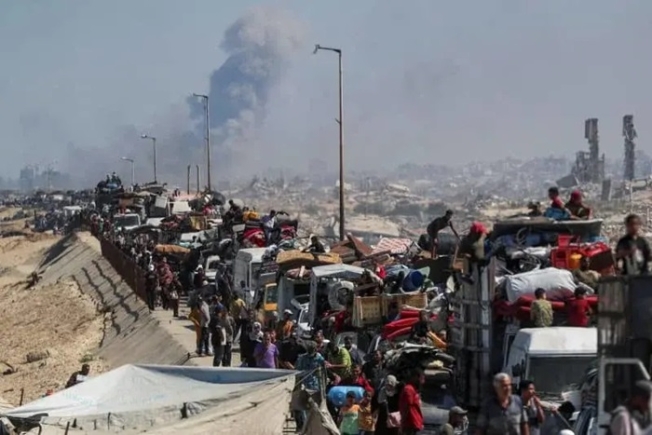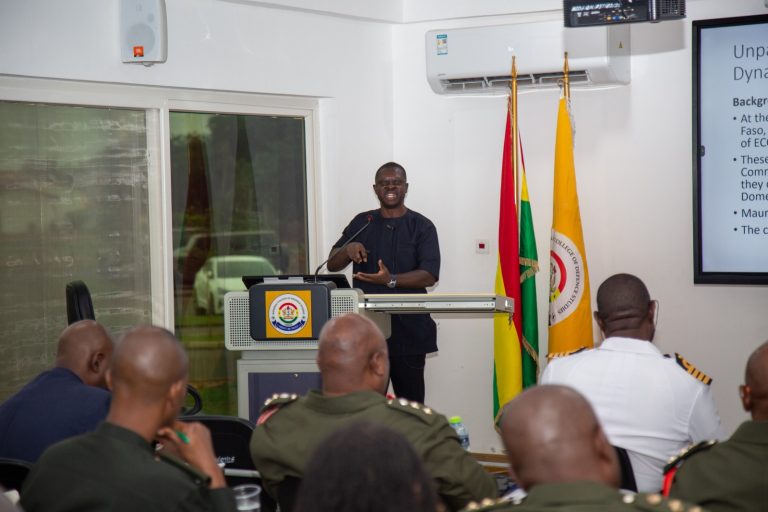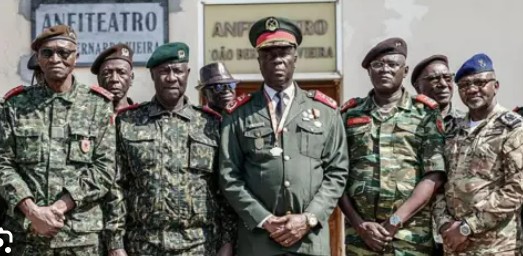Kwasi Prempeh, legal scholar and governance expert, is the Executive Director of the Centre for Democratic Development in Ghana (CDD-Ghana).
The professor of law is the Project Director, West Africa Democracy Solidarity (WADEMOS) Network, a non-partisan, independent coalition of over 30 pro-democracy Civil Society Organisations (CSOs) located in 15 countries in West Africa.
The network, which was formed last year, had its 2023 Annual Conference between 29 and 30 November in Accra, Ghana. The event had the theme: ‘Amplifying CSO Responses to Democratic Recession in West Africa’.
Mr Prempeh spoke with Ade Adesomoju on the sidelines of the WADEMOS conference on the issues of the need for all West African countries to adopt term limits for their leaders as well as on coups and instability in the region – which were among the topical issues thrown up for deliberations during the event.
EXCERPTS:
PT: The issue of term limits for West African leaders is one of the topical issues that have been stressed at this WADMOS conference. Many African leaders have justified having a system without such limits. Why do you think we need to have it in the constitutions of countries in the region?
Prempeh: The issue of term limits is important for us in West Africa, and I think for us generally, in Africa, because evidence suggests that countries that experience term limits tend to have much more peaceful transitions, peaceful turnover in governments and suffer less from democratic breakdown. This may not be a universal point. Some people will say that the term limit is not necessary, that if the people themselves are voting for somebody forever, why should you? But the truth of the matter is that in countries without term limits, there’s a very big structural advantage for the incumbent. An incumbent who doesn’t feel the prospect of term limits always has an incentive to remain and to rig the game to remain. So, for us, it may not be a matter of theory or democratic theory, but based on our experience in West Africa, with the kinds of civil wars we are going through, the kind of state failure that we have gone through in the region and all of that, the term limit is good. Look at Nigeria, look at Ghana – countries that used to suffer from coups upon coups – since we had term limit and since our governments started respecting it, we have made easy transitions even when the elections are not perfect or not good enough, we still have found a way to solve our problems. So, I think that for us in Africa, we cannot say that term limit is a bad idea. It has helped us to go through peaceful transitions, and to consolidate the small gains that we have made in democracy and others.
PT: Some argue that real development cannot be achieved by leaders who are limited by the number of terms they can run for office or remain in office.
Prempeh: Some people will say, well, but a government cannot deliver development in eight years. But term limit doesn’t mean that we must throw away a government after eight years. If the same party is doing good for the people, nothing stops the people from keeping the party in power for 12, 16 or 20 years, if you think development needs that longevity. But it doesn’t mean the development must come from one person. After all, the president is a mortal. What if the president dies in office? So, term limit doesn’t mean that a party cannot stay in power for a long time, or a party cannot stay to deliver the development that it wants to deliver. You take a country like Japan as an example, it has been ruled since the Second World War roughly by a single party. But the party is ruling because they win elections well and they deliver. So, it is possible within a term limit system to still have a party that continues to renew the mandate – that is if the people continue to renew their mandate, they can still stay. The idea of term limit is that not any particular individual, we must not build institutions around individuals. Even the party must be able to survive beyond that one individual. So, if you have two terms, that’s long enough for one individual in the party, the party can continue your good work. If you have built a succession plan into your party, you have cultivated more young leaders and other things, you can still have longevity in government even after you have left as the president. So, I think that there are a lot of misconceptions about term limits. Look at what happened in Gabon recently. If Gabon had a proper term limit, the coup would not have happened.
Countries without term limits have had the longest-serving presidents. And if the president dies in power, the likelihood of either a coup or instability happening is very high. We saw that in Cote d’Ivoire, and we have now seen it, of course, in Gabon as I said. What is going to happen in Cameroon? If you don’t have a term limit, then you’ll never cultivate this habit, this pattern of recycling and renewing leadership and all of that.
Term limit allows other people to come and show what they can provide the country. No one person has all the answers, no one president, however brilliant or good, has all the answers. So, we, at WADEMOS, are strongly in favour of term limits. And I think that it’s so unfortunate that we have not been able to regionalise it as a norm in West Africa.
PT: We had a time when it was almost adopted in principle by West African leaders. What happened?
Prempeh: We came close to it in 2015. It didn’t happen because of the veto by one or two members, I think it was at the time, The Gambia and Togo. But I think we must continue with the call for it. The evidence suggests that it makes for peace and stability.
PT: Why were the overwhelming majority decisions of ECOWAS leaders not able to override the minority decisions?
Prempeh: The reason this has become difficult is that ECOWAS makes decisions at the heads-of-state level by consensus. So even if 15 or 14 leaders want term limits as a norm and one member or the other member doesn’t want it, you don’t adopt it. And I think ECOWAS sometimes must move beyond trying to get everybody on board. If there are 13 people saying term limits must be the norm, I think our decision-making processes must get to a point where we can say ‘Yes, ECOWAS think that term limits should be the norm, the two that are dissenting cannot stop us from progressing’. If your country doesn’t want it, it doesn’t mean that we who have adopted it as a norm should also discard it. So, in a way, I think the decision-making processes of ECOWAS are probably what is standing in the way of the adoption of this principle. But if Nigeria has agreed, Ghana has agreed, Sierra Leone has agreed, Senegal has agreed, and if as many countries in the region as possible have agreed, why should the only two holdouts stop us? Are we saying that if we want to, say, adopt a norm against military coup, and two countries say ‘No, we don’t think there’s anything wrong with a military coup’, we will stop adopting it? If we say we don’t like an unconstitutional change of government, the fact that there is a coup leader in the room shouldn’t mean that that coup leader would say ‘No, no, no, I dissent.’

We have gone through civil wars in Liberia, Sierra Leone and other places because of leaders who don’t want to leave power. And we have concluded that leaving power and not staying there forever is a good idea. Why can’t we make that a norm and our regional problems are not just national problems? These days, problems in one country affect the other country. If instability happens in Togo, it is going to affect Ghana, it’s going to affect Benin. If people start agitating around term limits in a particular country, it is not going to be contained in that country alone. Our problems are more regional these days. So, I think we must be able to understand that when it comes to issues like leaders not leaving office, failed elections, and security concerns, these are regional concerns and they should not be treated as country-specific problems. I think the whole idea of ECOWAS is for us to understand that we are in this together.
PT: Don’t you think ECOWAS heads of state adopted the consensus decision-making style based on their understanding of the limits of its powers – because there is an extent to which it can impose things on sovereign nations
Prempeh: When you want to create an organisation from scratch, and you want everybody on board, consensus-building is a key mode of decision-making. But as the organisation matures, and grows, you must be able to make decisions, you must be able to amend your rules. So, maybe at the beginning of ECOWAS, they wanted everybody to be part of it, they did not want to exclude anybody. So, consensus might be the thing they chose to get everybody on board. Well, since the organisation has formed, has matured, you go to the next stage in the lifecycle of the organisation. At that point, if you think the norm is good for the region, based on our experience as a region, and if you think that issues of elongation of tenure in office, issues of rigged elections, issues of security, and all of the ideas that are dangerous to the region as a whole, the majority of the people must be able to say so without being held back by others who don’t want to move forward. I think it is good to get everybody on board, but not for every decision. Where the regional stakes are very high, where the threat to the stability of the region is very high, I think that we have to be able to make decisions that benefit the whole region and not just like one person vetoes it and keeps the stack from making progress.
PT: Do you think that West African leaders have learned necessary lessons from some of the issues that precipitated these coups that we have had, as the recent case in Niger has shown?
Prempeh: I think a certain generation of West African leaders have learned. Niger is not the only country that used to have coups. Ghana used to have coups, Nigeria used to have a lot of coups, Sierra Leone, Liberia, all of us, many of them have learnt. I think the coups happening in the Sahelian half of the region, our brothers and sisters mostly in the Sahel, howbeit, the context may be different, they have peculiar state fragility issues, where the ability of the states to control its borders, therefore the ability of the state to secure the territorial integrity of the state is all at risk because they face those particular problems. It is not that they want coups. It’s not that the people of Niger or those countries want coups, but it’s almost like when you cannot provide basic security, basic safety and public safety for your citizens, it is easy for somebody to take advantage of that opportunity and say, ‘you are not governing properly, so we’ve overthrown you’.
So, you notice that those countries that don’t have state fragility issues, where the state is stable, may not be the best governing state or the most efficiently run, but have at least basic security. Once you have state-ness, then you can build on it and build democracy. In a way, I empathise with the challenges that our brothers in Burkina Faso, Mali and Niger are going through – state fragility issues, terrorism and all of those things. But based on everything we are learning from Afrobarometer, even with those things, people still want to be governed by the democratically elected, they want their governments to be removed peacefully and democratically. They want to choose their leaders. But sometimes the circumstances are very desperate. And so, soldiers can take advantage of it and say, ‘Well, because we are fighting terrorism, we need soldiers to be the ones who are ruling’. But every piece of evidence suggests that since the coups, the security problems in those countries have gotten worse – Burkina Faso has lost more territory to terrorism after the coup d’état than before the coup. So, even the idea that the soldiers could have done this better, is proven to be empirically false. Because when they take over, their attention as soldiers is divided between governing the country and fighting external forces. When you were focused on fighting alone, it was difficult, and now you have to divide your attention between governing the country, fighting external forces and watching out for possible counter-coups. Immediately, you cross that line, other people are also going to want to take over from you. So already we have had two coups in Burkina Faso in that short period.
There is a state fragility issue. I think at the ECOWAS level, we should take that into account. That is why I’m happy to hear that there’s this ECOWAS standby force that they are reactivating like ECOMOG. Why did we bring back ECOMOG? We brought ECOMOG because there were some states in the region with peculiar state fragility issues in Sierra Leone and Liberia. And that until we stop the war, you can’t build peace and democracy based on war. Right? So ECOMOG came in to stop those conflicts to stabilise the country and then to democratise it. The moment a country is in a war and hasn’t secured its border, state-ness becomes a critical issue. And it’s a priority, democracy becomes secondary. And that is part of the challenges in the Sahel. So, we should help our brothers and sisters in the Sahel to get state-ness. Once they have states, all of these opportunistic coups and all of that may not happen. We should all collectively identify the problems of coups. It is complex. Some people say it’s about bad governance. No! Bad governance is part of governance. That is why democracy gives you a choice. Democracy allows you to throw away a bad government, and bring a better one. So bad governance is why we have democracy so that we have choices. You don’t need coups because of bad governance. We need more democracy. We need more accountability. We need more free and fair elections so that if you govern badly the people can throw you out. We don’t need a coup d’état because of bad governance.
PT: Heads of state of ECOWAS are meeting next week (this week) and WADEMOS would like them to make term limit to be part of the agenda they will discuss. What efforts are you making or how much have you engaged the relevant authorities in the region to ensure that they put it on the agenda?
Prempeh: A good point. That is part of the issues we face, getting something onto the agenda of ECOWAS is not something that there is even a process for. The idea of ECOWAS was to start from ECOWAS of the heads of state, but eventually to ECOWAS of the people.
There must be a process for citizens to be mobilised through civil society and other avenues to get something onto the agenda for the heads of state. We don’t have that. It’s almost like a closed door. You don’t even know the agenda. You don’t know how to get into it. And all of that may have been how they started. But ECOWAS must have reform, be open to democratising better and engage with civil society. Look at the ECOWAS parliament. Currently, we elect our parliamentarians and they want to get to parliament in Abuja, Accra or Abidjan, then they choose somebody to go to the ECOWAS Parliament. So, the people don’t even know they are electing anybody to go to parliament; when they are voting, you don’t know that.
At some point, ECOWAS must have an agenda that says, for instance, by 2040, 2050 or 2060, we are going to have a system where when people are voting in Ghana, we will designate certain seats or constituencies as ECOWAS seats and the people will vote, especially for those people and they will have you vote for them as independent candidates to go to the ECOWAS parliament. So, gradually we are democratising the ECOWAS parliament, and I think we have to be able to get issues on the agenda. There must be a way in which, within ECOWAS, civil society can engage.
We are going to still meet in Abuja next week. We are going to be in Abuja and have a campaign. WADEMOS is having a campaign around the term limit issue. We don’t want the heads of state to think that the term limit agenda is gone, because a coup is now what everybody’s talking about – how to prevent a coup. But the coups have a source and cause. In some of the countries not all of them, term limit was one of the problems. So, we need to stay focused and keep pushing the term limit issue. We need to solve the term limit issue.
Interview transcribed by Emmanuel Agbo.
Source: Premium Times Nigeria



